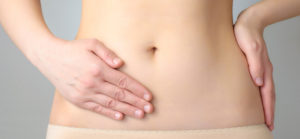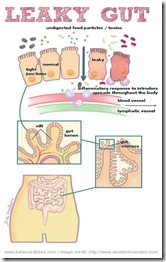Fibromyalgia is much more than just having pain in the muscles. As those of you who have fibromyalgia surely know there are a whole host of problems that accompany the muscle pain. In this blog I am going to discuss one of the most frequent symptoms I see with most of my fibro patients. GI or gastro intestinal symptoms affect up to 80% of those that have fibromyalgia. These GI complaints usually present themselves as IBS or irritable bowel syndrome. Sometimes the patient may also have severe acid reflux or gas and bloating. Other times they complain of intestinal cramping and lower abdominal pain. It still confuses me as to why these symptoms have perplexed doctors for so many years. I say that because often fibro patients are sent for numerous GI tests that reveal no true pathology. Upper endoscopies, barium swallows, abdominal CT scans, ultrasound and colonoscopies most often show that nothing is wrong. They are often then just given some medicine to ease the symptoms but the underlying condition is rarely if ever addressed.
 So, what is causing the pain? What is causing all the intestinal discomfort? What is causing the burning stomach and the backing up of acid into the esophagus? With the vast majority of my fibromyalgia patients the answer is usually one of two things. Either they have a motility problem which is caused by an imbalanced autonomic nervous system or they have “leaky gut”. Actually many times they have both problems occurring at once. The imbalance in the autonomic nervous system is because certain neurotransmitters become imbalanced and this we know is part of the overall fibromyalgia syndrome. This is known as IBS and although recognized by all health care providers, in my opinion, is often handled improperly. Most doctors try to use medicines to either slow down the digestive process to control diarrhea or speed it up to help with constipation. They try to buffer the acid with a base or prescribe medicines known as PPIs to reduce the overall production of acid. Often this type of treatment is not only ineffective, it is counterproductive.
So, what is causing the pain? What is causing all the intestinal discomfort? What is causing the burning stomach and the backing up of acid into the esophagus? With the vast majority of my fibromyalgia patients the answer is usually one of two things. Either they have a motility problem which is caused by an imbalanced autonomic nervous system or they have “leaky gut”. Actually many times they have both problems occurring at once. The imbalance in the autonomic nervous system is because certain neurotransmitters become imbalanced and this we know is part of the overall fibromyalgia syndrome. This is known as IBS and although recognized by all health care providers, in my opinion, is often handled improperly. Most doctors try to use medicines to either slow down the digestive process to control diarrhea or speed it up to help with constipation. They try to buffer the acid with a base or prescribe medicines known as PPIs to reduce the overall production of acid. Often this type of treatment is not only ineffective, it is counterproductive.
The best way to explain what happens with “leaky gut” is to explain how the intestines work normally. The absorption of most of our vital nutrients happens in our intestines. Normally small little microscopic holes allows vitamins and minerals to get through and be absorbed into our blood stream. In leaky gut, the intestinal lining becomes inflamed and those normally tiny holes become larger allowing macroscopic toxins to pass through. This creates a severe immune response and changes the levels of many mediating chemicals. This often causes a tremendous amount of symptoms that are far reaching and often would seem to be unrelated to the actual intestines themselves. Symptoms as diverse as muscle pain and even rashes can occur because the body is having an immuno response to trying to fight the toxins being absorbed.
 Why does this happen? Why do our intestines either become too slow, too fast or develop “leaks”? There are several reasons this can develop including severe stress, a disordered flora from antibiotics and an improper diet. We know for sure that stress changes neurochemistry and therefor can change the motility of the bowels. This is one reason why when people get nervous, they feel that proverbial “knot in their stomach”. We also know that the gastro intestinal tract needs a proper flora (beneficial bacteria) in order to work correctly and keep the lining healthy. Of course we should all recognize the direct effect foods have on the health of the GI system. Foods that are filled with toxic chemicals and or highly processed are certainly not going to be conducive to stomach or intestinal health.
Why does this happen? Why do our intestines either become too slow, too fast or develop “leaks”? There are several reasons this can develop including severe stress, a disordered flora from antibiotics and an improper diet. We know for sure that stress changes neurochemistry and therefor can change the motility of the bowels. This is one reason why when people get nervous, they feel that proverbial “knot in their stomach”. We also know that the gastro intestinal tract needs a proper flora (beneficial bacteria) in order to work correctly and keep the lining healthy. Of course we should all recognize the direct effect foods have on the health of the GI system. Foods that are filled with toxic chemicals and or highly processed are certainly not going to be conducive to stomach or intestinal health.
Often people with severe GI distress feel overwhelmed and don’t know where to begin to start the healing process. They should all be encouraged that these types of complaints can be greatly alleviated with the right type of approach. Usually there are a few of factors that need to be addressed but I always prefer to take the critical or main precipitating factor first. I always recommend stress reduction techniques for anyone who has GI complaints. Gentle stress reduction exercises like Ti Chi, Qi Gong or Yoga are tremendous to help reduce the release of those powerful stress hormones. Meditation is extremely effective and in many of my patients has truly helped turn their life around. In order to restore the correct flora, I often recommend probiotic supplements along with FOS which is a beneficial sugar that the good bacteria like to eat. This gives them an easier time at getting a “foot hold” and helping the gut to heal. I also often advise digestive enzymes taken with each meal to help ease the strain of digestion and help carry some of the load until the GI tract becomes healthy enough to work more efficiently. Lastly and tremendously important is a good healthy diet.



